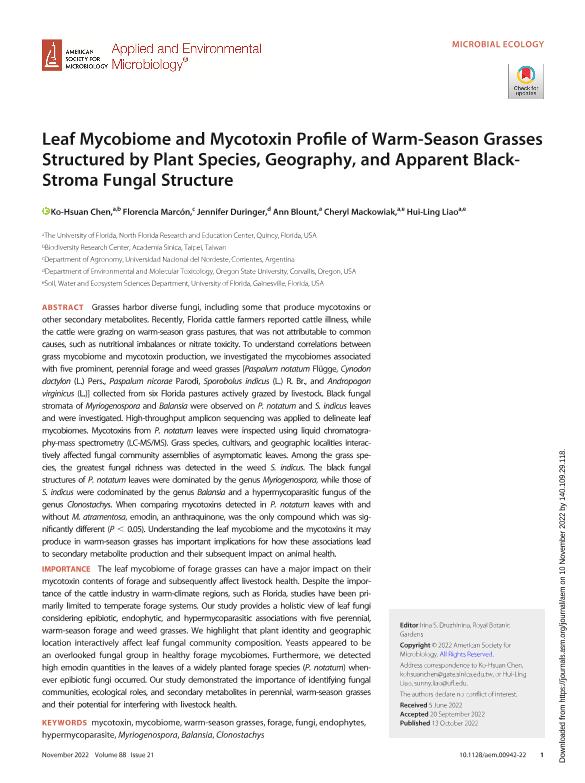Mostrar el registro sencillo del ítem
dc.contributor.author
Chen, Ko Hsuan
dc.contributor.author
Marcón, Florencia

dc.contributor.author
Duringer, Jennifer
dc.contributor.author
Blount, Ann
dc.contributor.author
Mackowiak, Chery L.

dc.contributor.author
Liao, Hui Ling
dc.date.available
2023-08-01T12:13:39Z
dc.date.issued
2022-11
dc.identifier.citation
Chen, Ko Hsuan; Marcón, Florencia; Duringer, Jennifer; Blount, Ann; Mackowiak, Chery L.; et al.; Leaf Mycobiome and Mycotoxin Profile of Warm-Season Grasses Structured by Plant Species, Geography, and Apparent Black- Stroma Fungal Structure; American Society for Microbiology; Applied and Environmental Microbiology; 88; 21; 11-2022; 1-19
dc.identifier.issn
0099-2240
dc.identifier.uri
http://hdl.handle.net/11336/206286
dc.description.abstract
Grasses harbor diverse fungi, including some that produce mycotoxins or other secondary metabolites. Recently, Florida cattle farmers reported cattle illness, while the cattle were grazing on warm-season grass pastures, that was not attributable to common causes, such as nutritional imbalances or nitrate toxicity. To understand correlations between grass mycobiome and mycotoxin production, we investigated the mycobiomes associated with five prominent, perennial forage and weed grasses [Paspalum notatum Flügge, Cynodon dactylon (L.) Pers., Paspalum nicorae Parodi, Sporobolus indicus (L.) R. Br., and Andropogon virginicus (L.)] collected from six Florida pastures actively grazed by livestock. Black fungal stromata of Myriogenospora and Balansia were observed on P. notatum and S. indicus leaves and were investigated. High-throughput amplicon sequencing was applied to delineate leaf mycobiomes. Mycotoxins from P. notatum leaves were inspected using liquid chromatography- mass spectrometry (LC-MS/MS). Grass species, cultivars, and geographic localities interactively affected fungal community assemblies of asymptomatic leaves. Among the grass species, the greatest fungal richness was detected in the weed S. indicus. The black fungal structures of P. notatum leaves were dominated by the genus Myriogenospora, while those of S. indicus were codominated by the genus Balansia and a hypermycoparasitic fungus of the genus Clonostachys. When comparing mycotoxins detected in P. notatum leaves with and without M. atramentosa, emodin, an anthraquinone, was the only compound which was significantly different (P < 0.05). Understanding the leaf mycobiome and the mycotoxins it may produce in warm-season grasses has important implications for how these associations lead to secondary metabolite production and their subsequent impact on animal health.
dc.format
application/pdf
dc.language.iso
eng
dc.publisher
American Society for Microbiology

dc.rights
info:eu-repo/semantics/openAccess
dc.rights.uri
https://creativecommons.org/licenses/by-nc-sa/2.5/ar/
dc.subject
BALANSIA
dc.subject
CLONOSTACHYS
dc.subject
ENDOPHYTES
dc.subject
FORAGE
dc.subject
FUNGI
dc.subject
HYPERMYCOPARASITE
dc.subject
MYCOBIOME
dc.subject
MYCOTOXIN
dc.subject
MYRIOGENOSPORA
dc.subject
WARM-SEASON GRASSES
dc.subject.classification
Agricultura

dc.subject.classification
Agricultura, Silvicultura y Pesca

dc.subject.classification
CIENCIAS AGRÍCOLAS

dc.title
Leaf Mycobiome and Mycotoxin Profile of Warm-Season Grasses Structured by Plant Species, Geography, and Apparent Black- Stroma Fungal Structure
dc.type
info:eu-repo/semantics/article
dc.type
info:ar-repo/semantics/artículo
dc.type
info:eu-repo/semantics/publishedVersion
dc.date.updated
2023-07-07T19:25:21Z
dc.journal.volume
88
dc.journal.number
21
dc.journal.pagination
1-19
dc.journal.pais
Estados Unidos

dc.journal.ciudad
Washington
dc.description.fil
Fil: Chen, Ko Hsuan. University of Florida; Estados Unidos
dc.description.fil
Fil: Marcón, Florencia. Consejo Nacional de Investigaciones Científicas y Técnicas. Centro Científico Tecnológico Conicet - Nordeste. Instituto de Botánica del Nordeste. Universidad Nacional del Nordeste. Facultad de Ciencias Agrarias. Instituto de Botánica del Nordeste; Argentina
dc.description.fil
Fil: Duringer, Jennifer. State University of Oregon; Estados Unidos
dc.description.fil
Fil: Blount, Ann. University of Florida; Estados Unidos
dc.description.fil
Fil: Mackowiak, Chery L.. University of Florida; Estados Unidos
dc.description.fil
Fil: Liao, Hui Ling. University of Florida; Estados Unidos
dc.journal.title
Applied and Environmental Microbiology

dc.relation.alternativeid
info:eu-repo/semantics/altIdentifier/doi/http://dx.doi.org/10.1128/aem.00942-22
dc.relation.alternativeid
info:eu-repo/semantics/altIdentifier/url/https://journals.asm.org/doi/10.1128/aem.00942-22
Archivos asociados
